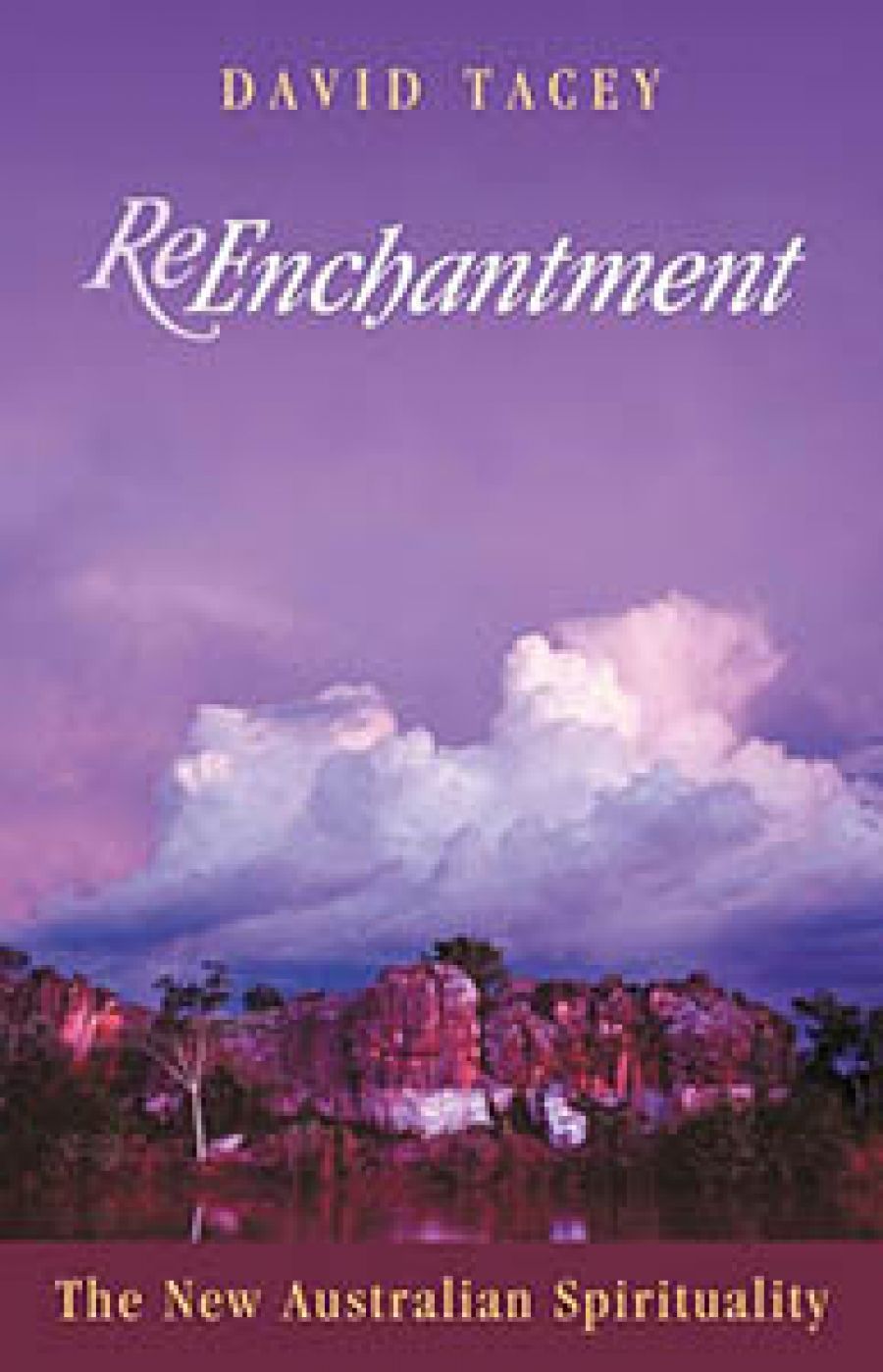
- Free Article: No
- Contents Category: Religion
- Review Article: Yes
- Article Title: Spiritual yearning
- Online Only: No
- Custom Highlight Text:
The cover of David Tacey’s earlier book on Australian spirituality, Edge of the Sacred, showed a few parched branches sticking out of the sand. The cover of this one is quite different: billowing clouds, rocks, water, lilac sunset colours. You might think that a certain blossoming had taken place; that Tacey’s project – the spiritualising of ‘secular’ Australia – had been wonderfully realised. On the other hand, the luscious hues of ReEnchantment’s cover may place the book more firmly still in the realms of fantasy – a genre that also happens to be popular with Tacey’s publisher, HarperCollins.
- Book 1 Title: ReEnchantment
- Book 1 Subtitle: The new Australian spirituality
- Book 1 Biblio: HarperCollins, $22.95 pb, 304 pp
Tacey’s notion is that Australians are both lacking and yearning for spiritual enchantment. Since it isn’t much interested in facts, it provides no evidence for any of this yearning other than a few anecdotes and the opinions of some fellow travellers. Various pronouncements about Australians are made with unwavering confidence, and are no doubt heartfelt. It’s admirable to see so much certainty amid the uncertainty and ambivalence of our times – which means, simply, that readers are either going to love this book (I’ve already heard one of the ABC’s New Age religious presenters breathlessly enthuse over it), or dismiss it outright as a load of old nonsense.
My own position tends towards the latter, I’m afraid. It is particularly striking to see just how little Tacey’s project has developed over the last ten years. It remains stuck with the same agendas, the same prejudices, the same heady clichés about Australia (its antiauthoritarianism’ and ‘tolerance’, for example), the same simple cure for complex realities. ReEnchantment does introduce the word ‘postcolonial’, missing from Tacey’s earlier book – and his passing comments about a ‘postcolonial ethic’ show a hint of something more relevant to the times. A book about postcolonial ethics would certainly have been useful. But any musings along these lines are subsumed under the crushing weight of Tacey’s ‘spiritual’ vision, with its literal-minded Jungianism and its pompous faith in the fact that it knows what is best for everyone and anyone.
The dominant metaphors in Tacey’s work are, of course, ‘depth’ and ‘maturity’. Australia is shallow and superficial, he says, in a New Age take on the old cultural cringe. Young Australians are made symptomatic of the nation’s lack of spiritual development: his breathtakingly patronising view of what he calls ‘youth’ is something to behold. Indeed, the smug and pompous air of this book is the hardest thing to bear. Its premise, that everyone is either lacking something or deluded, allows Tacey to speak of himself without irony as a prophet. He ‘smiles’ knowingly at other people’s apparent naïveté and pats himself on the back for the ‘risks’ he thinks he is taking.
I can’t say that Tacey’s project isn’t well-intentioned: after all, he speaks against economic rationalism, John Howard and environmental degradation, among other things. He’s pro-reconciliation, too, acknowledging the theological overtones of this term which, naturally, he sees as its strength – although others may take this as its fatal flaw. Tacey’s ‘spiritualisation’ of Australia in fact depends on reconciling white Australians with an Aboriginal ‘old religion’ (suitably vague here). It takes for granted the possibility that these two groups can, and would want to, live in perfect harmony with each other – although just as medieval descriptions of paradise stopped at the gates of heaven, so Tacey wisely decides to leave this promised land safely free of detail. Reconciliation in this model, where two so radically different partners suddenly come to ‘love’ and ‘share’ each other, is like a kind of Mills & Boon romance – which could also explain those billowing lilac clouds on the book’s cover.
Tacey is not alone in wanting Australians to be ‘reconciled’, to become a fully-integrated ‘community’. But his Jungian/New Age agendas are far too prescriptive and narrowly conceived even to begin to meet the demands of such an enterprise. Jungian discourse is mono-vocal and brooks no alternatives: it imagines it is the only way. Yet despite Tacey’s claim to speak for everybody, his audience is primarily AngloCeltic and white: those who already feel, at least in part, at home here. In fact, most of his citations are drawn from AngloCatholics: Les Murray, Kevin Han, Veronica Brady, Frank Brennan, Vincent Buckley. He dislikes multiculturalism because, he says, it respects the otherness of the other: for Tacey, reconciliation means that we are all the same and all fully integrated (some might say, assimilated) in the same way. In Tacey’s prescriptive world, there is nothing outside of Jung except ‘half-lives’ and alienation. That people might live decently without even having heard of Jung seems to escape him altogether.
This is, as a result, a strangely misanthropic book. It tries to include everyone, yet its view of the ‘people’ is unremittingly negative. At one point, Tacey feels compelled to protest that he doesn’t see Australians as ‘evil’! His populism is contradicted by a loathing of popular culture, the television especially – even though the United States, which happily seems to combine spirituality and daytime television, is held up as an ideal. He despises intellectual ‘elites’, yet his illustrations of the ‘spirit’ mostly come from high literature, poetry especially – genres barely read outside of the ‘secular’ universities which Tacey, who works as an academic, also scorns. His misanthropy aligns him poetically, in fact, with the early Romantics, with whom he shares a deep nostalgia for Nature. Indeed, Tacey’s sensibilities seem very much a pan of nineteenth century romantic structures of feeling. He·ends by asking Australians to go ‘back and down’ with him. Some of us, however, may prefer to go forward with our feet planted on the ground.


Comments powered by CComment